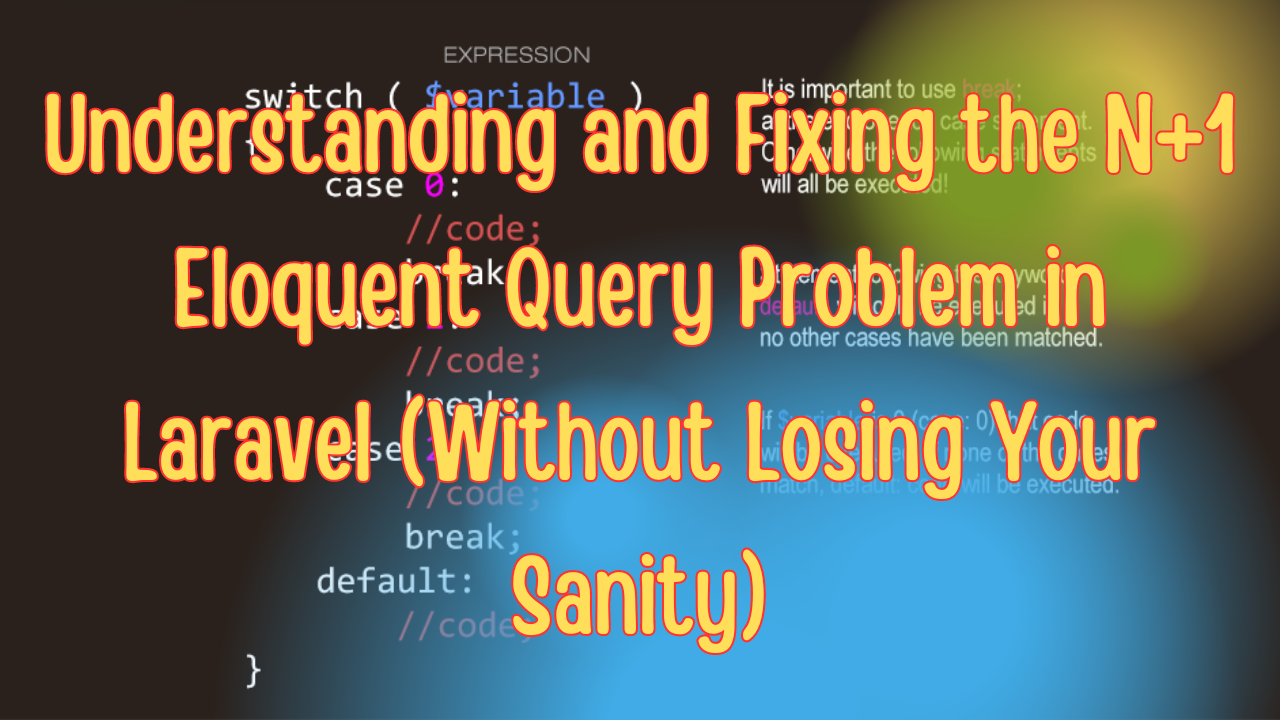Welcome, fellow developer! Today, we’re diving into the deep, dark world of the N+1 query problem—a common issue that’s probably been lurking in your Laravel projects like a sneaky ninja. Don’t worry though, by the end of this blog post, you’ll be ready to send that problem packing faster than you can say "artisan migrate."
Let’s break down what this N+1 problem is, how it messes with your application’s performance, and how you can fix it, all with a sprinkle of humor to keep things light!
What Is the N+1 Query Problem? (And Why Is It So Evil?)
Imagine you’re at a party. There’s one bartender (your initial query), and 100 thirsty guests (related models). Instead of pouring drinks efficiently, our bartender decides to ask each guest individually what they want and then runs back to the bar each time to get their drink. Sound inefficient? That’s exactly what the N+1 query problem is!
In developer speak, it happens when you run one query to fetch your primary records (like users, posts, etc.), and then for each of those records, you run additional queries to fetch related data. Here’s what that looks like in code:
$users = User::all();
foreach ($users as $user) {
// Each iteration triggers a new query to fetch the posts for each user
$posts = $user->posts;
}
With this approach, you end up executing 1 query to get the users, followed by N queries to get the posts for each user. If you have 100 users, congratulations—you’ve just written 101 queries for something that should only take 2. Cue the dramatic music.
Spotting the N+1 Problem Like a Pro Detective
How do you know if this sneaky issue is causing your app to slow down? Well, you could watch your database server sweat under the pressure, but there are better ways.
Use tools like Laravel Debugbar or Clockwork to see how many queries are being run for a particular request. If you notice an absurd number of queries happening, especially for something that should be straightforward, the N+1 problem is likely the culprit.
Or, if you prefer the old-school way, just look for any loops in your code where related models are being accessed. Loops and lazy loading are best friends when it comes to causing trouble.
Eager Loading: The Caped Crusader for N+1 Problems
Now that you’ve identified the problem, it’s time to bring in the hero of this story: Eager Loading. Eager loading says, “Why wait until you need something to fetch it? Let’s grab it all up front in one go!”
Here’s how you can rewrite the problematic code using eager loading:
$users = User::with('posts')->get();
foreach ($users as $user) {
$posts = $user->posts; // No additional queries are triggered here
}
Boom! Instead of running 101 queries, you’re now down to just 2. That’s like switching from dial-up internet to fiber—super fast!
How Eager Loading Works
Eager loading is as easy as using the with() method:
$users = User::with('posts')->get();
If you need to get fancy and load nested relationships:
$users = User::with('posts.comments')->get();
This loads users, their posts, and each post’s comments in just a few queries. It’s like ordering your groceries online and getting everything in one delivery instead of making 10 trips to the store.
When to Use Eager Loading vs. Lazy Loading
- Eager Loading: Use this when you know you’ll need related data right away. It’s like getting everything ready before your guests arrive.
- Lazy Loading: Use this when you’re not sure if you’ll need the related data. Just be careful about using it in loops—it’s a recipe for disaster.
Conditional Eager Loading with load()
Sometimes you fetch your main records and later realize, “Oh no, I need related data too!” Don’t panic—you can use the load() method to eager load relationships after fetching the main model:
$users = User::all();
if ($needPosts) {
$users->load('posts');
}
The load() method is like the friend who shows up late to the party but still brings the snacks.
Bonus Tricks: withCount() and withSum()
Need to count related records without actually loading them? Laravel’s got your back with withCount() and withSum():
$users = User::withCount('posts')->get();
foreach ($users as $user) {
echo $user->posts_count; // No extra queries needed!
}
These tricks let you gather aggregate data without carrying a heavy load. Your database will thank you.
Common Pitfalls to Avoid
Even eager loading can go wrong if you overdo it:
- Overloading with Eager Loads: Loading too many relationships can result in huge queries that slow things down. Be strategic—don’t bring the entire kitchen sink.
-
Nested Relationships: Loading deep relationships like
with('posts.comments.replies.likes')can cause your query to resemble a spider web. Sometimes, it’s better to rethink your approach.
Conclusion: Be the Hero Your Application Deserves
The N+1 query problem is sneaky, but it’s no match for you now! With eager loading and the right strategies, you can optimize your Laravel queries and keep your app running smooth as butter. Just remember to keep an eye on your queries, and don’t let lazy loading run wild in your loops.
Now go forth, optimize those queries, and be the hero your application needs! Happy coding, and may your queries be few and your performance high.




